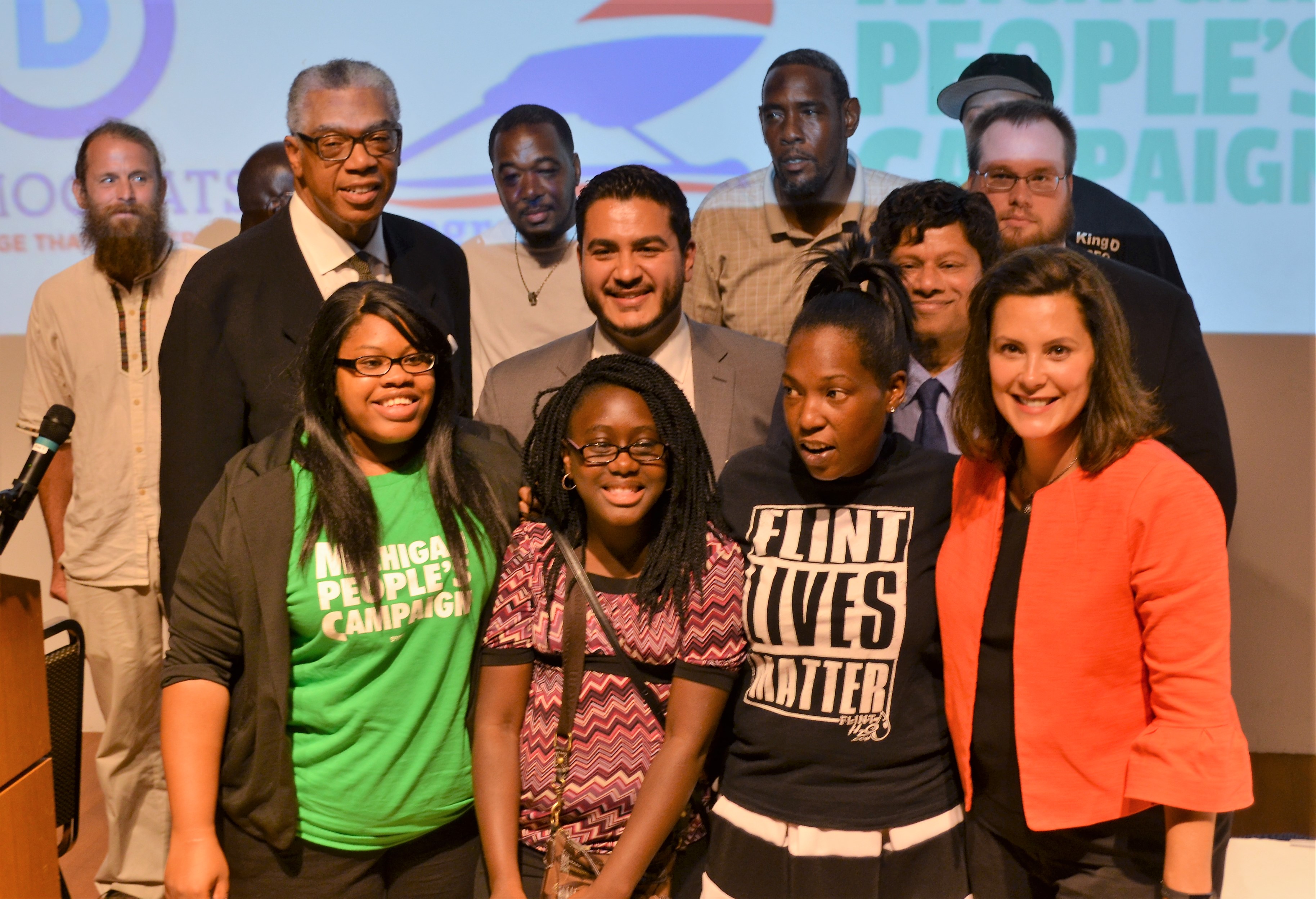By Paul Rozycki
 Flint may have just completed one election and is facing another this November, but that didn’t discourage the Progressive Caucus of Mid-Michigan, the Progressive Caucus of Flint, Michigan People’s Campaign and the UM-Flint College Democrats, from sponsoring the first forum for the 2018 governor’s nomination in Flint.
Flint may have just completed one election and is facing another this November, but that didn’t discourage the Progressive Caucus of Mid-Michigan, the Progressive Caucus of Flint, Michigan People’s Campaign and the UM-Flint College Democrats, from sponsoring the first forum for the 2018 governor’s nomination in Flint.
The forum, held at the UM-Flint Kiva on Aug.12, drew an audience of about 200 and gave area voters a chance to hear from four announced candidates for the Democratic nomination for governor—Gretchen Whitmer, Shri Thanedar, Dr. Abdul El-Sayed, and Bill Cobbs.
Bill Cobbs of Farmington Hills is a Navy veteran, Wayne State Law grad and retired vice president of the Xerox Corporation.
Dr. Abdul El-Sayed of Detroit is a physician and former director of the Detroit Health Department.
Shri Thanedar of Ann Arbor grew up in India and came to Michigan in 1979 to pursue a doctorate in chemistry. He is an author and entrepreneur who founded several chemical testing and pharmaceutical companies.
Gretchen Whitmer is a former state Senate minority leader who recently served as Ingham County prosecutor and lives in East Lansing.
The candidates responded to questions from both State Representative Phil Phelps, who moderated the discussion, and audience members. As one might expect from candidates of the same party, there was much agreement on many issues and the differences were often a matter of emphasis and degree.
While the overriding theme of the forum was the Flint water crisis, the candidates had a chance to address many issues during the two-hour forum.
They all said they felt the Flint water crisis was a result of poor leadership in Lansing and all proposed to change the climate in the governor’s office if elected.
Improve health care, education, jobs, infrastructure
When asked their major priorities, each candidate listed their first goals as governor.
Whitmer said she would fix the water problems in Flint, invest more in education, defend the Medicaid expansion in Michigan, and bring more and better paying jobs to the state. She emphasized her political experience as a state lawmaker.
El-Sayed said he would limit outside money in politics, bring greater transparency to government, improve the health care system in Michigan, create a program to improve the state’s infrastructure and end gerrymandering in the state.
Thanedar said he would like to make higher education more affordable, create a single payer health care system and develop plans to improve Michigan’s roads, bridges and water systems.
Cobbs’ stated his goal is to improve education on all levels, rebuild Michigan’s infrastructure and reform Michigan’s tax policy to make sure that major corporations paid their fair share of taxes.
The questions from the audience and Rep. Phelps gave the candidates on opportunity to respond to specific issues. Here too there was often much agreement.
When asked about the environment, all felt that the government had a major role to play in protecting the planet and would have supported the Paris Climate Accord or similar measures. Three of the four felt that the Enbridge Line 5, the oil pipeline that runs near the Mackinac Bridge, should be shut down. Whitmer said she was willing to listen to “solid science” before deciding, but emphasized that safety was paramount.
Unanimous Nix on the Emergency Manager Law

Democratic gubernatorial candidates with forum organizers and supporters: middle row (l-r) Bill Cobbs, Abdul El-Sayed, Shri Thanedar, and (in red jacket) Gretchen Whitmer (photo by Paul Rozycki).
All of the candidates urged a repeal of the current emergency manager law, in part because of its impact on minority cities like Flint. Cobbs said that “while the state has a responsibility to aid (cities)” the emergency manager law was “meant to destroy minority communities.” Also speaking of the emergency manager law, Thanedar said that “you can’t run a state like a business” and “there should be no management by numbers.” Whitmer felt that the law and the cut in revenue sharing “set up cities for failure.”
All four were skeptical of the increasing use of privatization of governmental services, particularly the increase in private for-profit schools.
When asked about how they would work with a Republican legislature, Whitmer spoke of her political experience and her ability to work with Republican Gov. John Engler on some issues. Cobbs said he would use the governor’s office as a “bully pulpit” to rally others and use his veto as needed.
On other issues Al-Sayed suggested that one solution to the mediate effects of lead on Flint’s children would be a “Flint Promise” where college costs would be covered under some circumstances. All of the other candidates agreed that education is a right and the state should do whatever possible to reduce college costs to students and their families.
Support for “single payer” system, Medicaid expansion
When asked about medical insurance, all the candidates supported the Medicaid expansion in Michigan and both Sayed and Thanedar supported a single payer system or “Medicare for all.”
Community member Jia Ireland asked what each would do about job growth and retention. They all emphasized the important role of education in building Michigan’s talent base for economic growth. Whitmer and Cobbs supported expanded infrastructure projects to assure jobs and Thanedar said he was the only one who had actual business experience in creating private sector jobs.
All were in favor a legalization of marijuana and reform of current drug laws.
American dream for “a Muslim guy” and an Indian immigrant
When asked a question about current immigration policy all felt that President Trump’s policy limiting immigration was wrong and that the state should not actively support it. However both Sayed and Thanedar offered very personal insights on the issue. Sayed said his father came to the country “to live the American dream,” and it worked out well for “a Muslim guy whose dad came to this country and didn’t speak English all that well.” Thanadar, who was born in India and came here in 1979, said he “had my American dream” when he came to pursue his career in the U.S.
In the end they all promised to support the candidate of their party and “fight the good fight” against the Republican candidate.
The leading Republican candidates are Attorney General Bill Schuette and Lt. Governor Brian Calley, though several others have also announced an intention to run.
Both parties will nominate their gubernatorial candidates in the August 2018 primary election.
EVM political writer Paul Rozycki can be reached at paul.rozycki@mcc.edu.


You must be logged in to post a comment.